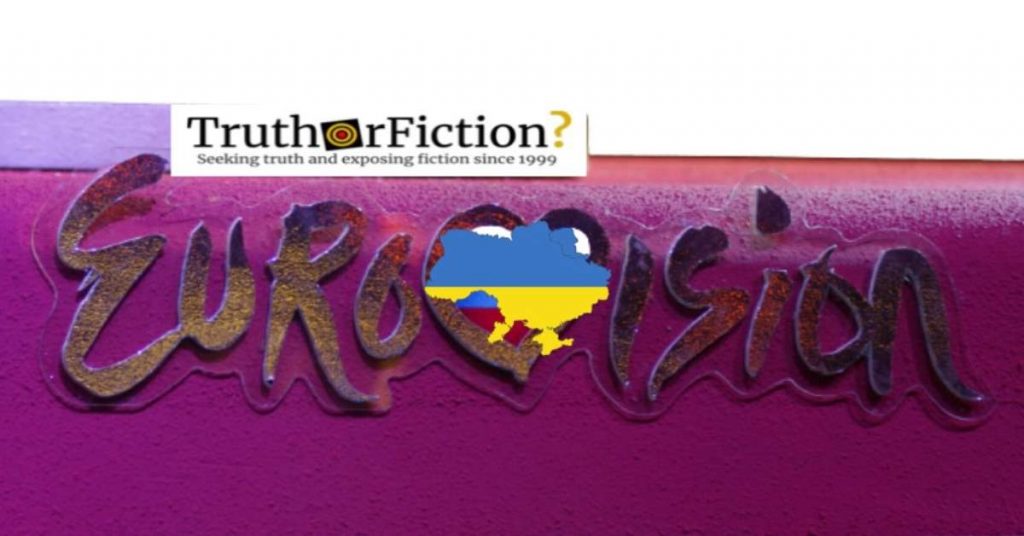Russia’s expulsion from the Eurovision music competition in February 2022 for invading Ukraine was a reversal of course from contest organizers — but not a first-time ocurrence.
“The decision reflects concern that, in light of the unprecedented crisis in Ukraine, the inclusion of a Russian entry in this year’s Contest would bring the competition into disrepute,” said the competition’s organizing body, the European Broadcasting Union (EBU), in a statement. “Before making this decision the EBU took time to consult widely among its membership.”
Fact Check
Claim: Russia was expelled from the Eurovision 2022 music competition for invading Ukraine
Description: Due to the unprecedented crisis in Ukraine, the European Broadcasting Union (EBU) made the decision to expel Russia from the Eurovision 2022 music competition. This decision was believed to be necessary in order to maintain the integrity of the competition, which could have been called into disrepute if a Russian entry was allowed under the circumstances.
The decision was announced on February 25 2022, a day after the EBU (which describes itself as an “unpolitical member organization of broadcasters”) had said that Russia would not be sanctioned for invading Ukraine.
Reuters reported that the EBU reversed course amid pressure from other member countries:
Finland said on Friday it would not send contestants to the final if Russia was allowed to participate. Public broadcasters in Ukraine, Sweden, Denmark, the Netherlands, Lithuania and Norway had all urged the EBU to expel Russia.
Russia had not placed an entry into the 2022 edition of the contest prior to its ouster. The EBU’s ruling means that 40 countries — including Ukraine — will take part. The competition will be held in Turin, Italy with the finals scheduled to be broadcast on May 14 2022.
Ukraine will be represented in the competition by the rap group Kalush Orchestra, a selection that speaks to how the tension between that country and Russia manifested through Eurovision.
The group had actually finished second in Vidbir 2022, the annual contest through which Ukraine selects its Eurovision entry. But the winner, Alina Pash, came into question because of a rule enacted two years earlier in response to Russia’s prior invasion of Crimea. As the pop culture news site Wiwibloggs reported:
Entrants must not have performed in the territory of the Russian Federation since 2014. They also can’t have entered Crimea “in violation of the legislation of Ukraine”. Furthermore, they cannot have plans to do either during the competition or Eurovision.
Pash withdrew from Eurovision less than a month before Russia invaded Ukraine, following questions regarding a 2015 trip she took to Crimea. Ukrainian officials told the BBC that her representative “falsified a certificate” related to the trip.
Eurovision itself dates back to 1956; but despite not entering the competition until 2003, Ukraine has won twice. The country’s second win, in 2016, was delivered by Jamala, a singer of Crimean descent. Her song “1944” addressed the deportation of Crimean Tatars carried out by the Soviet Union under Joseph Stalin.
Jamala said at the time that her grandmother was among an estimated 229,000 people removed from their homes. The song opens with these lyrics:
When strangers are coming, they come to your house
They kill you all
and say
We’re not guilty
not guilty
“Of course it’s about 2014 as well,” she told the Guardian before her win. “These two years have added so much sadness to my life. Imagine – you’re a creative person, a singer, but you can’t go home for two years. You see your grandfather on Skype, who is 90 years old and ill, but you can’t visit him. What am I supposed to do: just sing nice songs and forget about it? Of course I can’t do that.”
The Russian entry that year, pop star Sergei Lazarev, finished third. As The Daily Beast reported, his upset loss prompted a backlash:
Russia’s political establishment, its state media, and tenderheaded fellow travelers of Putin are livid at what they clearly see as Eurovision’s hotbed of Tatar solidarity and European liberals’ attempt to rob them of a bauble. TV channel Russia-1 did its level best at damage control. “1944,” we were told, wasn’t an anguished threnody about a violent 20th-century population transfer at all; rather, it was “another prayer for people who either voluntarily or involuntarily leave their home in search of a better life.”
In keeping with Eurovision rules, Jamala’s win allowed Ukraine to host the 2017 contest. While some Russian officials first threatened to boycott the event, the issue was moot; the country’s proposed entrant, Yuliya Samoylova, was barred from entering the country for violating a separate federal travel ban. Russian officials also refused an offer from the EBU to let Samoylova participate remotely, prompting them to be ousted from that year’s contest as well.
“We very much wanted all 43 countries to be able to participate and did all we could to achieve this,” the EBU said at the time.
- EBU Statement Regarding the Participation of Russia in the Eurovision Song Contest 2022
- Russia Banned From Eurovision Song Contest Over Invasion of Ukraine
- Ukraine: Vidbir 2020 Final Set for 22 February... But Artists with Recent Russian Performance History are Banned From Entering
- Putin Reclaims Crimea for Russia and Bitterly Denounces the West
- Alina Pash: Singer Won't Represent Ukraine at Eurovision
- The Dark History Behind Eurovision's Ukraine Entry
- Jamala - 1944 (Ukraine) 2016 Eurovision Song Contest
- Eurovision 2016: Ukraine's Jamala Wins With Politically Charged 1944
- EBU: "Russia no longer able to take part in Eurovision 2017"

